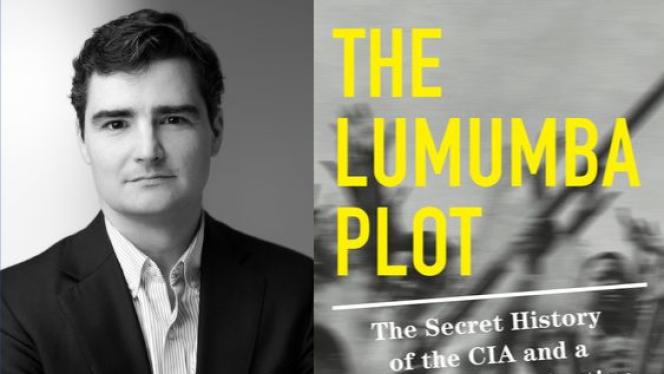Friday 22 November 2024
How did the West get away with Lumumba’s assassination?

Stuart Reid’s new book, The Lumumba Plot, revisits Patrice Lumumba’s assassination, with strong insight into the role of the US in assassinating Lumumba and bringing down the government of one of Africa’s most iconic leaders.
Patrice Lumumba, the former prime minister of the Democratic Republic of Congo (then known as the Republic of Congo), holds a near-mythical status among people across Africa and beyond. Many have sought to reclaim his powerful pan-African and anti-colonial legacy to inform their own perspectives on the meanings of decolonization, the ruthlessness of empire, and resilience in the fight for independence.
Lumumba’s transformation into a pan-African political icon is closely tied to the circumstances of his assassination in 1961. Few remember much about the man at all though, argues Reid. The Belgians—the DRC's old colonial power—teamed up with the US government and the UN to depose Lumumba and brutally kill him. Belgium aimed to protect its mining assets, the US was “fighting” communism, and the UN was a latecomer to the imperial joyride against Congo’s democracy.
The story has all the ingredients for a political thriller: vindictive and greedy empires, minerals, a democracy derailed, an ambitious leader seeking to turn his country’s fortunes around and betrayal. Though the CIA played a crucial role, it was Mobutu, a political ally, who had Lumumba killed.
Lumumba’s body was then dissolved in a pale of acid, leaving only his teeth. Mobutu would go onto rule the country for 30 years.
Over the years, the circumstances of Lumumba's death have slowly come to light. Early authors primarily held the Belgians accountable, as Belgium had mining concessions in the mineral-rich Katanga province and attempted to block Congolese control over those resources.
The role of the UN became clearer over time through then-Secretary-General Dag Hammarskjold, who, in secret, told US diplomats that "Lumumba must be broken" and bribed Congolese troops not to come to the aid of their besieged prime minister. Ludo de Witte's The Assassination of Lumumba demonstrated the extent of Belgian involvement in the operation and, crucially, their attempts to turn the US against Lumumba.
Washington, until then, had been prevaricating over whether it would, as one senior economic adviser to Eisenhower put it, stand with “the metropole powers” or “throw our influence on the side of those who seek political and economic autonomy,” risking ties with a NATO ally. Eventually, it sided with Belgium, throwing the full force of its diplomatic and covert apparatus against the fragile Lumumba administration with Eisenhower’s greenlight.
Stuart Reid whose new book, The Lumumba Plot: The Secret History of the CIA and a Cold War Assassination, attempts to shed greater light on the US role in Lumumba’s assassination speaks to Geeska about that intervention and its legacy in Congo.
--
Faisal Ali: A lot of ink has been split on this topic, so I wonder what pulled you towards it and what you hoped to add with your contribution?
Stuart Reid: There has been a lot of good work on the Belgian role in the crisis, but the American role has come to light more in recent years. In 2013, a big trove of CIA cables was declassified, so anyone writing before then couldn’t have had the full picture. I wanted to partially take advantage of that opportunity. Even as late as this year, I was finding documents that were less redacted than they were previously.
FA: You’re careful in the book not to say you’ve found a literal smoking gun comment by Dwight Eisenhower, but you argue that he did order the assassination of Lumumba – the first by a US president for a foreign head of state during the Cold War. Can you take us through some of what has convinced you that he gave the order?
SR: I have no doubt that Eisenhower ordered Patrice Lumumba’s assassination. We know that from a few pieces of evidence. The first for me is the Church Committee which was a senate investigative body that released a report in 1975. They interviewed a notetaker Eisenhower had with senior staff, and that notetaker testifies that Eisenhower said something to the effect that Lumumba had to be assassinated. He asked if he should note that down and was told not to.
Another piece of evidence was something that I stumbled upon in the Eisenhower presidential library in Kansas where I found a note with Lumumba’s name with a large black X next to it. That on its own is not proof but is very suggestive.
And then for me the ‘what happens next’ is also evidence. Poisons were sent to be delivered to kill Lumumba by the CIA, and when the station chief there asked where the order had come from, he was told it came from the top, President Dwight Eisenhower. So, adding all that up, it seems inconceivable that Eisenhower did not say something to that effect.
FA: One of the key characters in your book is Larry Devlin, a relatively inexperienced CIA agent stationed in what you describe as a “backwater in a backwater” for the agency. You also argue Devlin operated quite unsupervised and the assassination attempt appears quite haphazard. Can you tell us about the attempts by the CIA to undermine Lumumba and assassinate him?
SR: This was the wild west days of the CIA; it was a young organisation and because of the slowness of communications, you needed people who could act with a degree of autonomy. There was also barely any congressional or presidential oversight too.
There was bumbling and disorganised behaviour in some cases, for example the plan to poison Lumumba and in others it was lethally successful. For example, they encouraged, President Kasavubu to fire Lumumba and he did; they encouraged Mobutu’s coup against Lumumba and organised the search party which captured him. They also greenlighted the final transfer by Mobutu of Lumumba to a province where it was known Lumumba would be killed.
FA: One of the things that strikes me about your book is that many US officials concluded that Lumumba wasn’t the dyed in the wool political radical they had anticipated they’d meet, nor was he a “jungle primitive.” In fact, by accounts in the book he left a relatively positive impression on most people he met. Why didn’t that change the attitude of the US foreign policy elite toward his brief administration?
SR: After he died, Lumumba became this kind of myth, and all sorts of ideas were attributed to him that there is little evidence he held. He was fiercely anti-colonial and anti-Belgian of course, but what surprised me was how pro-American he was at start. He was at pains to remind everyone that he wasn’t a Soviet client, again and again.
The best example of that is his visit to Washington in July 1960 in which he called on the US government to send their troops to the DRC which is hardly a pro-Soviet move. He also wanted the US to provide more scholarships. He was fundamentally misread.
He knocked on their door for help, they rebuffed him, and it was then that he turned to Moscow. The US in some ways drove him into the arms of the Soviets and even then, Moscow wasn’t keen to take him on nor did it really have the capacity.
FA: Do you think they misconstrued his staunch Congolese nationalism and his dislike of Belgian rule with pro-Soviet sympathies?
SR: Yes, the Cold War was the overarching context, and the US was gripped in a kind of paranoia. This totally distorted their thinking.
FA: Does it surprise you that Congo isn’t more anti-American along the lines of Iran for example considering the killing of a promising former leader from their country?
SR: It is surprising in some ways. But you have to consider that after Lumumba, a US client was installed in Congo who ruled for over thirty years. Mobutu didn’t dedicate much energy to flaring up anti-American sentiment because it was unhelpful for him.
FA: Your book argues that the contest in the Congo was the opening salvo genuine globalisation of the Cold War. How do you fit the Korean War and the overthrow of Mossadegh and other incidents before Lumumba’s overthrow and assassination?
SR: I meant this in the sense that prior to that if we look at Guatemala, Korea, Iran, this was the first conflict which wasn’t close to either country or in their geopolitical “backyards.” I don’t want to overstate the point, but it is an important early theatre of the Cold War in the Third World.
It also became a model for US covert action which to an extent was copied and replicated elsewhere. We saw this script playout repeatedly after Congo of the US supporting some unsavoury characters when their only ‘virtue’ is that they’re pro-American.
FA: Let's move on to the legacy of this affair and specifically Mobutu. He nationalised a lot and was incredibly unpredictable, pursuing policies, you argue, that Lumumba might not have – nationalisations for example. Why didn’t they view him in the same way?
SR: In some regards you could probably say that America didn’t even get what it paid for by putting him in power. But his regime was stamped with ‘made in America.’
It was simple really, when presented with the choice of replacing Mobutu and allowing someone else possibly hostile to come to power or sticking with a turbulent but known quantity like the Mobutu regime, the latter is always the easier choice. He represented, supposedly, continuity and stability and it was after the Cold War that his regime’s usefulness expired.
FA: He is basically dropped like a bad habit after a period as a cartoon dictator, one of Africa’s worst arguably. I enjoy the way you weave their two stories together, but I wondered what you make of the meaning of Mobutu considering what happened to Lumumba and what each came to represent?
SR: Mobutu was Lumumba’s protege or intern and Lumumba gives Mobutu a great deal of responsibility – especially the Africanisation of the Congolese army which before Mobutu was staffed at the officer level by Belgians exclusively. They were very close and so it isn’t a stretch to say that Lumumba created Mobutu. Their relationship is at the core of this story and specifically Mobutu’s betrayal of Lumumba when he has him killed.
And at the height of ironies, Mobutu later coopts the legacy of Lumumba, later building monuments to the man he killed and commemorating his death. In that sense the story comes full circle.
FA: How does the story you’ve told fit into the broader sweep of Congelese history, especially the persistent instability with has plagued the country since the Mobutu regime was anointed by the CIA?
SR: I think the country was never really given a chance to enjoy the fruits of independence and go through the motions. In that regard, the rise of Mobutu is a critical moment. He really ran the country into the ground and exacerbated existing issues whilst creating new ones.
It is the most important historical event that explains Congo today because the institutions were gutted, or not created, theft was normalised, he was repressive and erratic, and the collapse led to a civil war, the embers of which still burn in some places. He is responsible to that degree, but I also think we can pin a considerable amount of responsibility on the US too.









